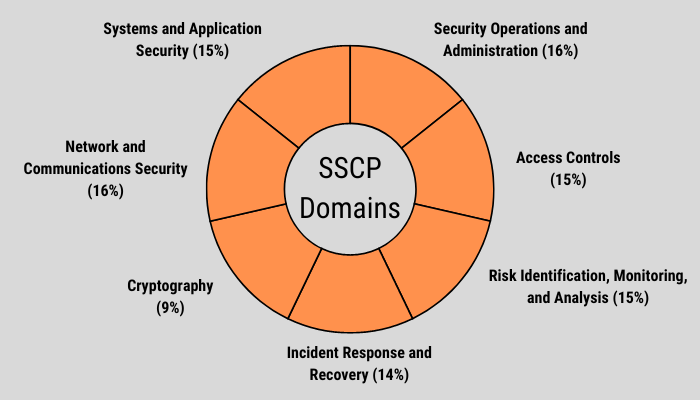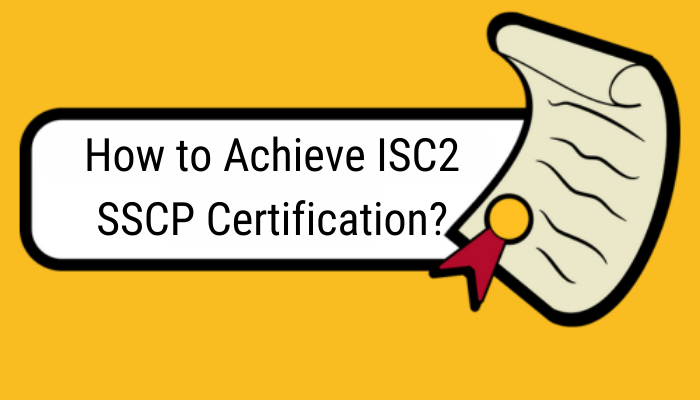Numerous rewarding professions exist within the realm of Information Technology, with a significant portion centered around cybersecurity. Opting for an ISC2 SSCP certification is a widely chosen avenue that can contribute to professional growth. Acquiring a certification focused on security practices elevates potential career opportunities and facilitates a deeper comprehension of the field.
The SSCP certification is one of the various IT cybersecurity certifications provided by the International Information Security Certification Consortium, Inc. (ISC)2.
What is SSCP Certification?
The acronym SSCP represents Systems Security Certified Practitioner, which serves as a certification tailored for individuals engaged in IT administration. Furthermore, it is overseen and furnished by a renowned entity recognized as ISC2. Additionally, this credential is optimal for individuals possessing demonstrated technical expertise and hands-on security acumen within operational IT positions.
The certification is designed for professionals with at least one year of practical work background. Additionally, candidates should have accrued at least one year of combined, full-time paid employment in any of the seven domains covered by the SSCP CBK.
Benefits of SSCP Certification
Gaining the SSCP certification presents a multitude of benefits.
- It boosts professional reputation, expands employment opportunities, and provides the potential for higher earnings.
- Individuals holding the SSCP certification acquire a thorough comprehension of security principles, empowering them to make valuable contributions to their organization’s security stance.
- Moreover, it establishes a strong groundwork for progressing further in cybersecurity.
How to Obtain SSCP Certification?
ISC2 offers a checklist that directs candidates through the prerequisites for obtaining the SSCP certification, which involves becoming a member of a worldwide organization for diverse IT professionals.
- Enroll as an (ISC)² candidate by setting up an organizational account.
- Acquire the required professional experience.
- Fulfill a minimum of twelve months of combined, paid practical experience within one or multiple domains covered by the (ISC)² SSCP Common Body of Knowledge (CBK).
- Opt for the one-year prerequisite route if you hold a degree in the field of cybersecurity.
- Successfully clear the SSCP examination.
- Finalize the application procedure by validating your assertions regarding your professional experience.
- Dedicate yourself to upholding the (ISC)² Code of Ethics.
- Submit the initial Annual Maintenance Fee (AMF) payment.
SSCP certification: Examination structure and prerequisites
The SSCP certification examination is a computer-based assessment comprising 125 multiple-choice queries. Test takers are granted a three-hour window to conclude the exam. A minimum passing score of 700 out of 1000 points is required for success in the SSCP exam. To be eligible for the SSCP exam, candidates must hold at least one year’s experience in any of the seven domains encompassed by the certification. Alternatively, candidates can secure the Associate of (ISC)² designation by completing the SSCP exam and accruing the requisite experience for full certification.
The examination assesses the candidate’s proficiencies across the subsequent seven technical areas:

SSCP Certification Requirements
- To seek the SSCP certification, candidates must possess at least one year’s combined work experience in one or multiple of the seven SSCP domains.
- A bachelor’s degree in a field related to cybersecurity can be used as a replacement for one year of experience.
- Furthermore, candidates must abide by the (ISC)² Code of Ethics and pass the SSCP exam.
Preparing Tips for the SSCP Examination
Thorough exam preparation is crucial to ensure your confidence and familiarity with the exam content. Success in the SSCP exam relies on your prior experience, understanding, and preferred learning approach. Presented below are some suggestions to guide your exam preparation:
1. Allocate Adequate Time for Preparation
It’s advisable to allocate more time than you think you’ll need to prepare for the exam. By scheduling the exam a few months ahead, you provide ample time to study. This approach also allows flexibility to accommodate any personal or work-related situations.
2. Join an Exam Training Course
Numerous organizations provide tailored training programs to aid individuals in their SSCP exam preparation. While independent study is an option, many individuals discover that enrolling in a course offers the advantage of comprehensive coverage of exam materials. Before deciding on a preparation course, ensure that it addresses the most current iteration of the exam.
3. Engage in the SSCP Practice Test
Engaging in an SSCP practice test aids in familiarizing you with the exam’s nature and can additionally assist in pinpointing areas for enhancement. You can acquire a study guide containing practice queries and explanations or explore online resources for practice tests.
5. Make Use of Study Materials
Diverse learners find value in different tools, approaches, and materials. Identifying the methods that aid your retention of crucial information is essential. For instance, a common technique is creating flashcards to memorize acronyms and port numbers, which numerous individuals employ as they prepare for the exam.
6. Give Yourself Sufficient Time While Taking the Exam
When sitting for the exam, employ your time judiciously. You have around 100 seconds on average to respond to each question. While this might appear limited, reading each question at least twice to ensure a clear understanding before providing an answer is crucial.
7. Utilize the “Flag for Review” Option
During the SSCP exam, you can mark specific questions for later review before finalizing your exam submission. This allows you to bypass specific questions and return to them later if time permits. This approach can be time-efficient, preventing you from getting stuck on a single answer for an extended period.
8. Attempt to Respond to Every Question
It’s vital to respond to all exam questions. Even if you lack certainty in your answer, guessing is preferable to leaving a question unanswered. Notably, there are no negative consequences for incorrect answers.
SSCP Salary and Professional Prospects
The SSCP certification aids IT professionals in broadening their understanding of cybersecurity. Those who achieve certification can advance in their career path, gaining promotions and increased remuneration opportunities.
The SSCP certification offered by (ISC)2 stands out as one of the top introductory-level credentials. It equips individuals with the specialized knowledge and practical experience to implement data security strategies and methods within organizations. Those possessing SSCP certifications could receive an average base salary of $75,000, as reported by PayScale, with the potential to earn up to $114,000 based on their role and location.
Conclusion
With the growing emphasis on enterprise cybersecurity, safeguarding IT infrastructure and data systems has become imperative. This explains the elevated demand for certified information security professionals, sought after in both public and private domains. The SSCP certification offered by (ISC)2 ranks among the top-tier certifications to aspire for, promising prospective career pathways and leading-edge salaries within the industry.






